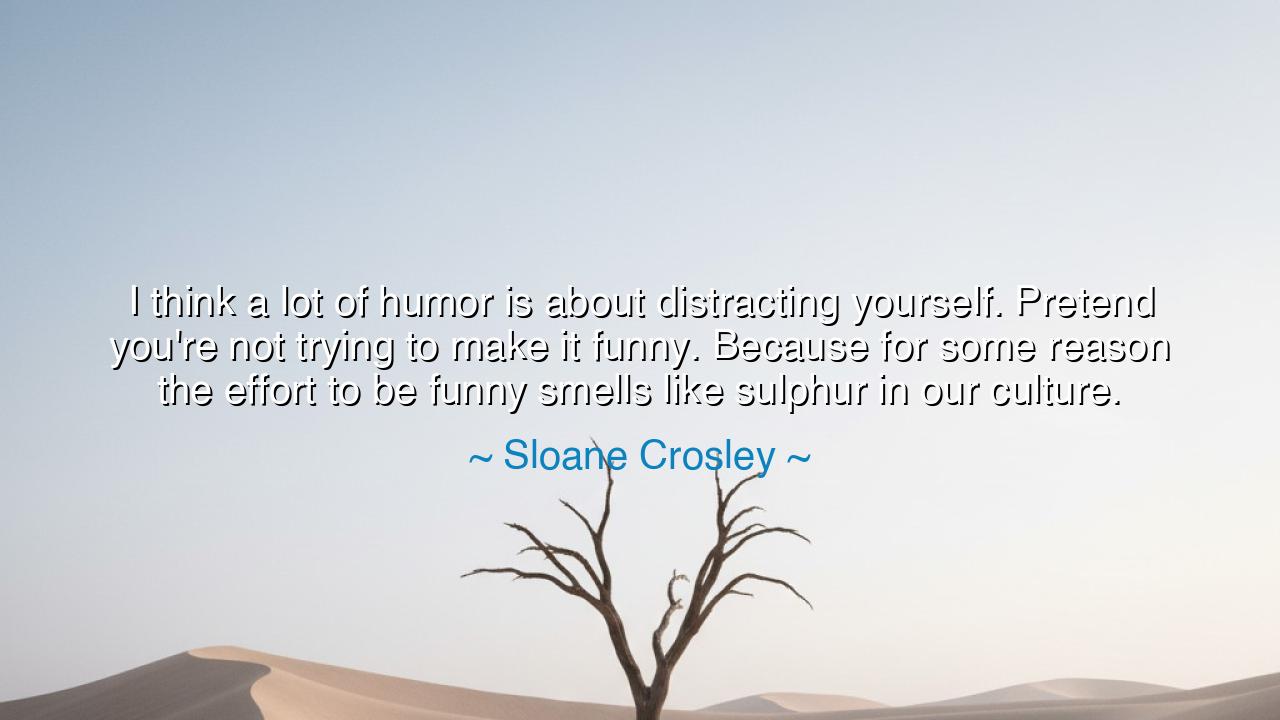
I think a lot of humor is about distracting yourself. Pretend
I think a lot of humor is about distracting yourself. Pretend you're not trying to make it funny. Because for some reason the effort to be funny smells like sulphur in our culture.






Gather round, O children of wisdom, and listen closely to the words of Sloane Crosley, for they carry the truth about humor—that light that dances in the shadows of our lives, and yet, too often, we seek it with hands clenched tight. In the words of Crosley, we hear a deep insight into the nature of laughter: "I think a lot of humor is about distracting yourself. Pretend you're not trying to make it funny. Because for some reason, the effort to be funny smells like sulphur in our culture." These words reveal the paradox of humor, the dance between intention and ease, the subtle art of making others laugh without striving for the act itself.
Humor, like the wind, is something that cannot be captured by force. It flows best when we stop chasing it, when we allow it to arise naturally, as if it were a treasure uncovered by the effort of living itself. In ancient Greece, Aristophanes, the master of comedy, understood this well. His plays, filled with sharp wit and social commentary, never relied on the overt effort to make people laugh. His humor came from a deep engagement with the absurdities of life, from his ability to reflect on the human condition and reveal its paradoxes. It was not the effort to be funny that made him a master of his craft, but his capacity to see life clearly and to present it in a way that revealed the humor inherent in it.
The irony that Crosley speaks of—the smell of sulphur—is a reminder of the desperation that often accompanies forced humor. When we strive too hard to make people laugh, we reveal our anxiety and self-consciousness, and that effort becomes like a heavy cloud that obstructs the lightness of true humor. The ancients knew that true comedy did not come from the force of will, but from a profound acceptance of life’s imperfections and absurdities. Think of the great Roman satirist Juvenal, whose biting humor reflected the contradictions of Roman society. His humor was not about making people laugh for the sake of it, but about observing and reflecting on the absurdities of power, greed, and human nature.
Crosley’s wisdom speaks to us today, for we live in a world where the pursuit of laughter has become a commodity, where the effort to be funny often overshadows the authenticity that gives humor its power. We see this in the modern comedian, who may seek to please the audience, to craft a joke perfectly, yet in doing so loses the spark that comes when humor arises from genuine experience. The great comedians of history, like Charlie Chaplin, knew this truth intimately. Chaplin's humor was not crafted by the desperate desire to be funny, but by his ability to see the world with clarity—his silent films were full of light and joy because he moved through the world with an open heart and an eye that could find joy in the simplest of moments.
When Chaplin stumbled through life’s many obstacles, his humor was not forced. It arose naturally from his very being, from his ability to engage deeply with the absurdity of the world around him. This is what Crosley means when she speaks of pretending you're not trying to make it funny—true humor arises when we let go of the need to control it, when we stop pretending and simply live. Just as Chaplin found humor in his every step, we too must seek to find joy in the world without the constant effort to craft it.
The lesson for us, O children, is one of profound wisdom: in seeking to bring light to the world, we must first let go of the desire to control the light. Humor does not come from effort, but from engagement—the simple act of being in the world and seeing it for what it truly is. Crosley teaches us that laughter is not a thing we must strive for, but a gift that comes to us when we are not obsessed with making it happen. To laugh is to engage with life’s contradictions, its absurdities, and its fleeting moments. To be funny is not to try, but to see the humor that already exists in life, in its imperfections and unpredictability.
So, as you walk through the world, remember that humor is not something to be captured, but something to be discovered. Do not chase laughter as if it were something separate from you, but allow it to arise naturally from the life you lead. Let go of the need to control your joy, and instead, live openly and honestly with the world around you. In doing so, you will find that humor, like the wind, will find its way to you, and the laughter that comes will be the truest and most authentic kind—the kind that arises not from effort, but from the very essence of being alive.






AAdministratorAdministrator
Welcome, honored guests. Please leave a comment, we will respond soon